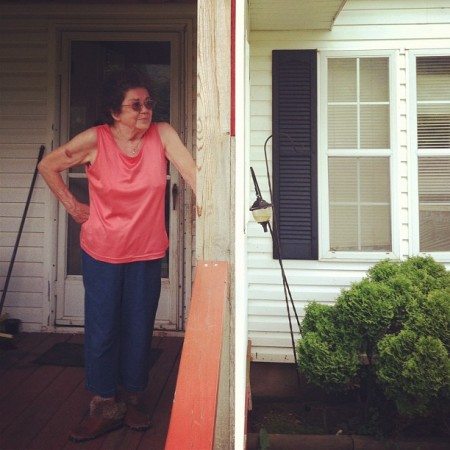Op-ed by Lisa Gensheimer

Judy Eckert stares at the remnants of a fracked shale well on a neighbor’s property 450ft from her home in Potter County, Pennsylvania. Her story is featured in the documentary, Triple Divide, showing how radioactive waste pits are being illegally buried without accountability or prevention from state regulators. Her case also uncovers ways in which clean pre-drill water testing is being dismissed or unaccounted for after a homeowner experiences water contamination, which frees gas companies from liability.
Thus far Judy’s story received zero visits, outside of Triple Divide & Solomon’s Words for the Wise, from local or national media. photo: J.B. Pribanic
Thumbs up to the Film Society of Northwestern Pennsylvania for bringing the documentary Triple Divide to the Erie Art Museum. Thumbs down to the Erie Times-News Viewpoint: Could Erie gain from fracking? which appeared the following morning.
Just as Public Herald journalists, Melissa Troutman and Joshua Pribanic, brought the results of their investigative study to the screen, the editorial touted talking points delivered by Governor Corbett on a recent visit to Erie. He was hoping to persuade voters that his job creation record is not as dismal as it seems (Pennsylvania has gone from 6th to 45th during his tenure despite the promise of Marcellus Shale jobs).
Environmentalists are not “turning up their noses” at jobs in the natural gas industry for frivolous reasons. These teachers, doctors, farmers, business owners and families are concerned about mounting evidence that unconventional natural gas drilling affects the water we drink and the air we breathe. We have the right to clean water and clean air, which, by the way, is guaranteed in Section 1 Article 27 of the Pennsylvania Constitution.
Triple Divide moves beyond the sensationalism of Gasland with science, fact-based reporting and personal stories from Pennsylvania’s shale fields. The filmmakers and a former employee of a natural gas company, whose job was to mitigate and sometimes cover up “mistakes,” urged citizens to pay attention. Hold local media accountable for reporting all of the stories, not just those from gas industry insiders, they said.
As we speak, exploratory wells are drilling beneath Greenfield Township in the Utica Shale. Some neighbors came to the screening and I could see the desperation in their faces. Will you go out and talk with them? Will you watch the film? Will you cover what the Erie region could *lose* from fracking?





The sensationalism of Gasland? What is sensationalistic about Gasland?
To clarify, Gasland, did a terrific job in focusing national and
international attention on the environmental and health damages related to fracking and the powerful government-industry relationship that allows it to go largely unregulated. The documentary opened the door to more investigative reporting, and that’s a good thing. The outreach and community engagement that followed, and that continues with Gasland II (which I have not yet seen), has been incredibly effective.
The style of Josh Fox’s documentary was far different from the straightforward, investigative style seen in Triple Divide, however. Ask audiences what they remember of Gasland, and it is flaming faucets and the filmmaker himself, Josh Fox, who places himself prominently in the story. In my opinion, Triple Divide is more hard-hitting and focused because it emphasizes science and directly holds the DEP accountable, not through inuendo, but through indisputable facts. As a filmmaker, I appreciate the careful editing and higher production values seen in Triple Divide.
The sensationalism of Gasland? What is sensationalistic about Gasland?
To clarify, Gasland, did a terrific job in focusing national and
international attention on the environmental and health damages related to fracking and the powerful government-industry relationship that allows it to go largely unregulated. The documentary opened the door to more investigative reporting, and that’s a good thing. The outreach and community engagement that followed, and that continues with Gasland II (which I have not yet seen), has been incredibly effective.
The style of Josh Fox’s documentary was far different from the straightforward, investigative style seen in Triple Divide, however. Ask audiences what they remember of Gasland, and it is flaming faucets and the filmmaker himself, Josh Fox, who places himself prominently in the story. In my opinion, Triple Divide is more hard-hitting and focused because it emphasizes science and directly holds the DEP accountable, not through inuendo, but through indisputable facts. As a filmmaker, I appreciate the careful editing and higher production values seen in Triple Divide.